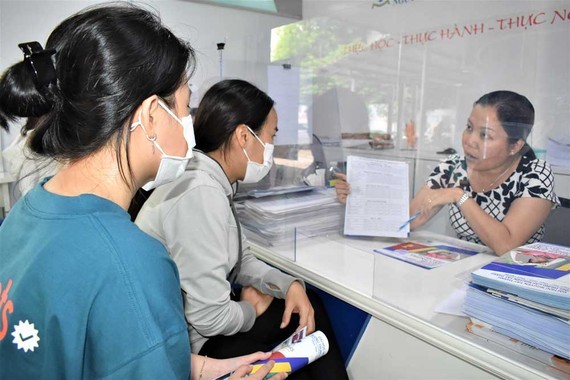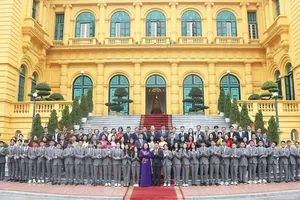 A student enrols in Nguyen Tat Thanh School
A student enrols in Nguyen Tat Thanh School
The reception area for parents and students of Nguyen Tat Thanh Vocational School was crowded with students and their parents who arrived at the school to enroll in the school on July 12.
Ms. Nguyen Thi Hoa in Ward 11 in Ho Chi Minh City’s Go Vap District said that her daughter got 15.25 points on the tenth-grade exam, failing in schools of her choice. After she was sleepless one night, she and her husband decided to let their child study at the Pharmacy faculty of Nguyen Tat Thanh Intermediate School.
She said that she doesn’t force the child to pass the exam into the tenth grade. Importantly, my child feels comfort and confidence, whether vocational training or continuing education is still an open path for her. Certainly, she was a little worried because the child is too young to learn a trade, but she supported the child.
Having just completed the admission procedure for the school, student Hoang Thi My Linh in District 12 said that due to the incorrect choice of schools, she failed in public senior high schools though she was a good student at junior high schools for four years.
Encouraged by her parents, she decided to study nursing for 3.5 years at Nguyen Tat Thanh Intermediate School. After four years, she will both have a high school certificate and a vocational training degree.
Teacher Hoang Quoc Long, Principal of Nguyen Tat Thanh Intermediate School, affirmed that students will focus on practical skills for studying professions such as styling and beauty care, commercial service business, and refrigeration to earn money after graduation.
Every year, Dai Viet Vocational College in HCMC spends about 15 percent of the 2,000 enrollment quota for ninth-graders failing to make the cut in public senior high schools. Moreover, students are supported with 50 percent of tuition fees for literature learning; plus, the school has a reward each semester to help good students to remove daily difficulties during studying at the school.
In addition, all majors have an employment rate of nearly 100 percent after graduation, said Dr. Le Lam, Rector of Dai Viet College.
At Vien Dong Vocational College, Dr. Tran Thanh Hai, the school's principal, said that by the end of July 10, the school had recruited nearly 30 percent of the quota for 15 tenth classes. Dr. Hai said, this is a very optimistic signal and believes that from now until the end of July, the school will recruit 50 percent of the quota of ninth-graders who failed in public senior schools.
According to teacher Long, there are two separate programs for unsuccessful ninth-graders to choose from. In the first program, after 2.5-3 studying years, learners will receive an intermediate degree, and at the same time, they will be granted a certificate of completion of literature study according to the regulations of the Ministry of Education and Training if they want to pursue schooling in any colleges.
If learners choose the second program, they will both receive vocational training and learn literature as per the continuing education program. After graduation, they totally can enter universities of their choice.
Currently, vocational schools including Vien Dong College, Ho Chi Minh City Economic - Technical College, Thu Duc College of Technology, Ho Chi Minh City International College, Ho Chi Minh City College of Economics, and Khoi Viet International Intermediate School are offering courses of automotive mechanics, industrial and civil electrical, hotel and restaurant operations, food processing technology, construction, business administration, logistics, and software creation.
Dang Minh Su, Head of Vocational Education Division under the Department of Labour, Invalids and Social Affairs of Ho Chi Minh City, said that in order to help vocational schools continue to attract students who don’t have high qualifying scores into public senior high schools, the department has implemented specific methods such as promoting communication to attract students, a portal to support enrollment, enrollment conferences, cooperating students with vocational education institutions, businesses.
In particular, they will benefit from the change in the appropriate training program with the job position requirements of the enterprise on the basis of national output standards or vocational skills standards and standards of enterprises.
























